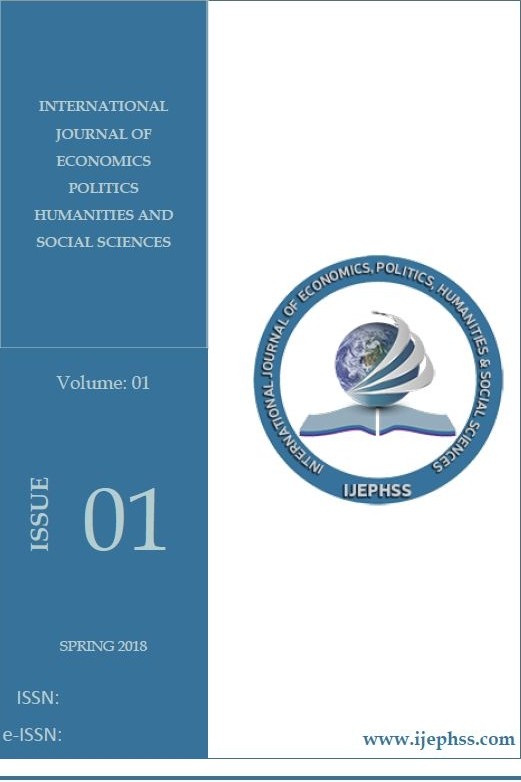GÜRCİSTAN'DA İNTERNET KULLANIMI VE YAŞAM DOYUMU
İnternet, Yaşam Doyumu, Logit, Mikro iktisat
INTERNET USE AND LIFE SATISFACTION IN GEORGIA
Internet, Life satisfaction, Microeconomics, Logit,
___
- Appleton, S., & Song, L. (2008). Life satisfaction in urban China: Components and Determinants. World Development, Vol. 36, No. 11, pp. 2325-2340. https://doi.org/10.1016/j.worlddev.2008.04.009
- Brown, D., Woolf, J., & Smith, C. (2012). An Empirical Investigation into The Determinants of Life Satisfaction in New Zealand. New Zealand Economic Papers, Vol. 46, No. 3, pp. 239-251. https://doi.org/10.1080/00779954.2012.657896
- CRRC (2021). Caucasus Barometer 2021: Georgia. The Caucasus Research Resource Centers. https://caucasusbarometer.org/downloads/cb2021ge/CB_2021_public.dta. (Access date: 22.04.2022).
- Doyar, B. V., Rzali, S., & Dikkaya, M. (2022). Development of the ICT Sector and the Determinants of Internet Use in the Southern Caucasus. Telecommunications Policy, (Article in Press). https://doi.org/10.1016/j.telpol.2022.102455
- Ebrahim, A., Botha, F., & Snowball, J. (2013). Determinants of Life Satisfaction Among Race Groups in South Africa. Development Southern Africa, Vol. 30, No. 2, pp. 168-185. https://doi.org/10.1080/0376835X.2013.797227
- Helliwell, J. F. Layard, R., and Sachs, J. (2013). World Happiness Report 2013. New York: UN Sustainable Development Solutions Network.
- Helliwell, J. F. Layard, R., and Sachs, J. (2015). World Happiness Report 2015. New York: Sustainable Development Solutions Network.
- Helliwell, J. F. Layard, R., and Sachs, J. (2016). World Happiness Report 2016, Update (Vol. I). New York: Sustainable Development Solutions Network.
- Helliwell, J. F. Layard, R., and Sachs, J. (2017). World Happiness Report 2017. New York: Sustainable Development Solutions Network.
- Helliwell, J. F. Layard, R., and Sachs, J. (2018). World Happiness Report 2018. New York: Sustainable Development Solutions Network.
- Helliwell, J. F. Layard, R., and Sachs, J. (2019). World Happiness Report 2019. New York: Sustainable Development Solutions Network.
- Helliwell, J. F. Layard, R., Sachs, J., and De Neve, J. (2020). World Happiness Report 2020. New York: Sustainable Development Solutions Network.
- Helliwell, J. F. Layard, R., Sachs, J., and De Neve, J. (2021). World Happiness Report 2020. New York: Sustainable Development Solutions Network.
- Helliwell, J. F. Layard, R., Sachs, J., De Neve, J., Aknin, L. B., and Wang, S. (2022). World Happiness Report 2022. New York: Sustainable Development Solutions Network.
- Helliwell, J. F., Huang, H., & Harris, A. (2009). “International Differences in The Determinants of Life Satisfaction” (Ed. Bhaskar Dutta, Tridip Ray, E Somanathan), New and Enduring Themes in Development Economics, pp. 3-40, World Scientific.
- Ji, J., Xu, X., & Rich, S. L. (2002). Determinants of Family Life Satisfaction in Reforming Urban China. International Journal of Comparative Sociology, Vol. 43, No. 2, pp. 169-191. https://doi.org/10.1177/002071520204300204
- Jovanović, V., & Joshanloo, M. (2019). The Determinants of Life Satisfaction in Serbia: Findings From The Gallup World Poll. International Journal of Wellbeing, Vol. 9, No. 1, pp. 43-60. https://doi.org/10.5502/ijw.v9i1.751
- Kamo, Y. (1998). Sociological Determinants of Life Satisfaction in Japan: The Roles of Gender, Family, and Work. International Journal of Japanese Sociology, Vol. 7, No. 1, pp. 127-153. https://doi.org/10.1111/j.1475-6781.1998.tb00060.x
- Kavetsos, G., & Koutroumpis, P. (2011). Technological Affluence and Subjective Well-Being. Journal of Economic Psychology, Vol. 32, No. 5, pp. 742-753. https://doi.org/10.1016/j.joep.2011.05.004
- Kolosnitsyna, M., Khorkina, N., & Dorzhiev, H. (2017). Determinants of Life Satisfaction in Older Russians. Ageing International, Vol. 42, No. 3, pp. 354-373. https://doi.org/10.1007/s12126-017-9297-3
- Lera-López, F., Billon, M., & Gill, M. (2011). Determinants of Internet Use in Spain. Economics of Innovation and New Technology, Vol. 20, No. 2, pp. 127-152. https://doi.org/10.1080/10438590903378017
- Long, J. S., & Freese, J. (2012). Regression Models for Categorical Dependent Variables Using Stata. Stata Press Publication, Texas.
- Meyer, D. F., & Dunga, S. H. (2014). The Determinants of Life Satisfaction in A Low-Income, Poor Community in South Africa. Mediterranean Journal of Social Sciences, Vol. 5, No. 13, pp. 163-163. http://dx.doi.org/10.5901/mjss.2014.v5n13p163
- Ngoo, Y. T., Tey, N. P., & Tan, E. C. (2015). Determinants of life satisfaction in Asia. Social Indicators Research, Vol. 124, No.1, pp. 141-156. https://doi.org/10.1007/s11205-014-0772-x
- Owusu Ansah, K., Dey, N. E. Y., Adade, A. E., & Agbadi, P. (2022). Determinants of life satisfaction among Ghanaians aged 15 to 49 years: A further analysis of the 2017/2018 Multiple Cluster Indicator Survey. PloS One, Vol. 17, No. 1, pp. e0261164. https://doi.org/10.1371/journal.pone.0261164
- Pénard, T., Poussing, N., & Suire, R. (2013). Does The Internet Make People Happier?. The Journal of Socio-Economics, Vol. 46, pp. 105-116. https://doi.org/10.1016/j.socec.2013.08.004
- Ulutürk-Akman, S. (2021). Determinants of Happiness and Life Satisfaction: The Life Satisfaction Survey of the Turkish Statistical Institute. Journal of Social Policy Conferences, No. 81, pp. 35-69. https://doi.org/10.26650/jspc.2021.81.986105
- Veenhoven, R. (2012). “HAPPINESS: Also Known as Life-satisfaction and Subjective Well-being” (Ed. Kenneth C. Land, Alex C. Michalos, M. Joseph Sirgy), Handbook of Social Indicators and Quality of Life Research, pp. 63-77, Springer Publishers.
- Wang, C., Liu, J., Pu, R., Li, Z., Guo, W., Feng, Z., Huang, R., Ghose, B., Ji, L., & Tang, S. (2020). Determinants of Subjective Health, Happiness, and Life Satisfaction Among Young Adults (18-24 Years) in Guyana. BioMed Research International, Vol. 2020, pp. 9063808. https://doi.org/10.1155/2020/9063808
- World Bank (2022). World Development Indicators. https://databank.worldbank.org/reports.aspx?source=world-development-indicators (Access date: 29.11.2022).
- Zhang, K., Pei, J., Wang, S., Rokpelnis, K., & Yu, X. (2022). Life Satisfaction in China, 2010–2018: Trends and Unique Determinants. Applied Research in Quality of Life, Vol. 17, pp. 2311-2348. https://doi.org/10.1007/s11482-021-10031-x
- Başlangıç: 2018
- Yayıncı: Onur OĞUZ
GEÇİŞ EKONOMİLERİNDE EKONOMİK VE TOPLUMSAL DÖNÜŞÜM: YUGOSLAVYA ÖRNEĞİ
Özge KOBAK, Yaprak KARADAĞ DUYMAZLAR
ÖZBEKİSTAN’IN DÖNÜŞÜM SÜRECİNDE MAKRO EKONOMİK VE FİNANSAL GELİŞMELER
GEÇİŞ ÜLKELERİNDE KAYIT DIŞI EKONOMİ VE KARAPARA KAVRAM İNCELEMESİ
Abdulkadir BİLEN, Havva BÖREKCİ ŞAHAN
GÜRCİSTAN'DA İNTERNET KULLANIMI VE YAŞAM DOYUMU
COVİD-19 PANDEMİSİNİN AZERBAYCAN’IN MAKROEKONOMİK GÖSTERGELERİNE ETKİSİ
GEÇİŞ EKONOMİLERİNDE EKONOMİK KARMAŞIKLIK VE EKONOMİK BÜYÜME İLİŞKİSİ: ÇEK CUMHURİYETİ ÖRNEĞİ
